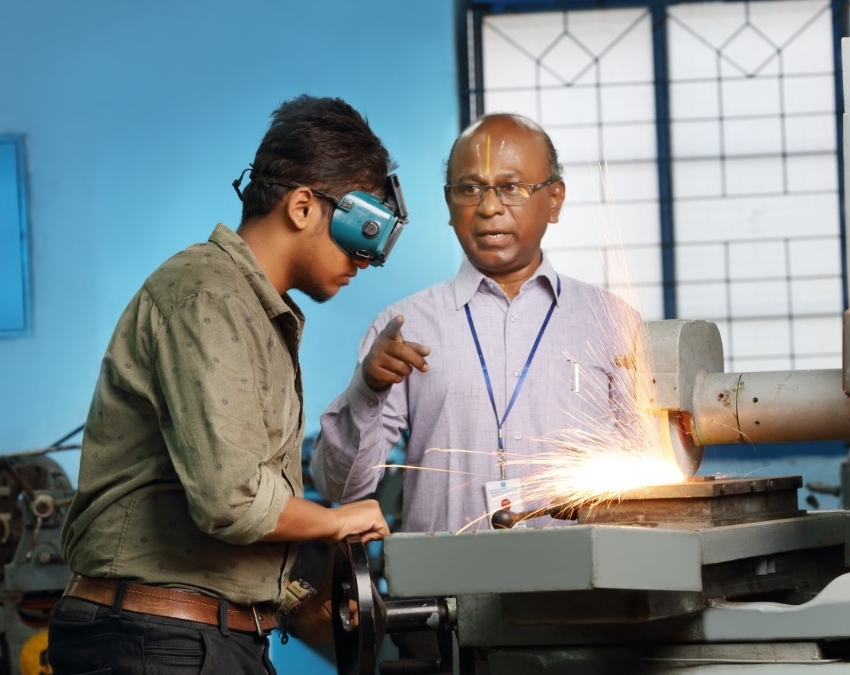
Future of Biomedical Engineering: Exploring Emerging Trends & Careers : Series 1
Biomedical Engineering (BME) is transforming the healthcare industry by merging technology with medicine to develop groundbreaking innovations such as artificial organs, AI-driven diagnostics, and bionic prosthetics. Despite its immense potential, BME is often overlooked as a niche field. In this exclusive interview, we speak with Ms.Abbirami, HOD – BME, KVCET, and Ms. N. Yuvarani, BME Alumni & Ultrasound Application Manager at Oreon Healthcare, to explore the career prospects, industry trends, and future opportunities in this dynamic field.
In the first part of our blog series, we ask experts to share their insights into the future of Biomedical engineering and the exciting career opportunities it offers. Join us as we feature valuable perspectives from:
● Ms.Abbirami – Head of the Department, Biomedical Engineering, KVCET
● Ms. N. Yuvarani – Alumni, BME, KVCET & Ultrasound Application Manager, Oreon Healthcare
This blog series will explore the latest trends in Biomedical engineering, offering actionable advice for aspiring professionals who are ready to make a significant impact in this rapidly expanding field.
Q1: What makes Biomedical Engineering (BME) a game-changer in healthcare?
Ms.Abbirami: Biomedical Engineering is at the heart of modern healthcare innovations. It brings together engineering and medicine to develop life-saving technologies like artificial organs, robotic surgeries, and AI-driven diagnostics. These advancements are making treatments more effective and accessible, helping doctors provide better patient care.
Ms. N. Yuvarani: What makes BME special is its direct impact on people’s lives. It’s not just about building machines—it’s about improving healthcare systems and making medical solutions more efficient. As someone who works with ultrasound technology, I see firsthand how BME innovations help doctors diagnose and treat patients with greater accuracy.
Q2: What kind of jobs can BME graduates explore?
Ms.Abbirami: BME graduates have a wide range of career opportunities. They can work in:
● Medical device companies like Siemens Healthineers, Medtronic, and GE Healthcare
● AI-driven startups developing smart health tech
● Hospitals, managing advanced medical equipment
● Biotech firms, working on drug delivery systems and regenerative medicine
● Public health and policy, helping improve healthcare systems at a larger scale
Ms. N. Yuvarani: From my experience, BME offers both technical and clinical career paths. Some graduates focus on research and product development, while others work closely with healthcare professionals to implement technology. In my role, I train doctors on ultrasound imaging, bridging the gap between medical technology and patient care.
Q3: How has a BME degree helped you in your career?
Ms. N. Yuvarani: Studying BME at KVCET gave me hands-on experience with medical imaging, hospital technology, and industry standards, which made my transition into the field much easier. Now, I work with healthcare professionals, helping them use advanced ultrasound machines to improve diagnosis and treatment. The practical training, internships, and exposure to new technologies at KVCET really prepared me for this career and opened up opportunities in hospitals, research, and healthcare technology companies.
Q4: What are some of the latest trends shaping BME?
Ms.Abbirami: The field is evolving rapidly, with innovations like:
● AI in healthcare – Smart diagnostics and personalized medicine
● Robotic-assisted surgeries – Precision treatments with minimal recovery time
● Wearable medical devices – Continuous health monitoring powered by AI
● Tissue engineering and 3D bioprinting – Creating artificial tissues for organ replacement
Ms. N. Yuvarani: In my area of work, real-time imaging and AI-powered diagnostics are making a huge impact. These advancements help doctors detect diseases earlier and treat them more effectively, showing how BME is improving healthcare every day.
Q5: Any advice for students considering Biomedical Engineering?
Ms.Abbirami: If you’re passionate about healthcare but also love technology, BME is the perfect field. It allows you to work on innovations that improve lives without being a doctor. Stay curious and explore different specializations within BME.
Ms. N. Yuvarani: Keep learning and adapting to new technologies. BME is an evolving field, and staying updated with trends like AI, robotics, and imaging will open up more career opportunities. The key is to stay curious and keep pushing boundaries.
Biomedical Engineering is an exciting, fast-growing field with endless possibilities. If you’re looking for a career that combines technology, healthcare, and real-world impact, BME is the perfect choice.






